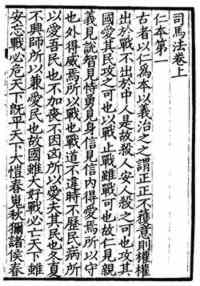
This book is a terse, enigmatic text from the 4th cent BC, Warring States period (戰國時代). It stands in the tradition of the military treatises of the state of Qi (齊), said to be compiled by Sima Rangju (司馬穰苴, or Tian Rangju 田穰苴). It rarely discusses tactics or any other aspects of battlefield commands but rather contains a variety of specific teachings for initiating military activities, mastering military administration, and managing military campaigns. As in most other military classics, it stresses that aiding the people by eliminating evil and hardship provides the only justification for mobilizing forces. Chapters of the book:
1.仁本 Renben, or Benevolence as the foundation
2.天子之義 Tianzi zhi yi, or Obligations of the Son of Heaven
3.定爵 Dingjue, or Determining ranks
4.嚴位 Yanwei, or Clarifying positions
5.用眾 Yongzhong, or Mobilizing masses
Exemplary translation:
3.定爵
凡戰:定爵位,著功罪,收遊士,申教詔,訊厥眾,求厥技,方慮極物,變嫌推疑,養力索巧,因心之動...
一曰人;二曰正;三曰辭;四曰巧;五曰火;六曰水;七曰兵,是謂七政。榮,利,恥,死,是謂四守。容色積威,不過改意,凡此道也。唯仁有親,有仁無信,反敗厥身。人人,正正,辭辭,火火。
凡戰之道,既作其氣,因發其政,假之以色,道之以辭,因懼而戒,因欲而事,陷敵制地,以職命之,是謂戰法。
凡人之形,由眾以求,試以名行,必善行之。若行不行,身以將之,若行而行,因使勿忘,三乃成章。人生之宜謂之法...
凡戰正不行則事專,不服則法,不相信則一。若怠則動之,若疑則變之,若人不信上,則行其不復。自古之政也。
Determining rank
In general, to wage war: first determine ranks and positions. Prominently record accomplishments and offenses, retain mendicant knights, publicize instructions and edits, make inquiries among the populace, seek out artisans, apply methodology to planning, fully exploit things, change the people’s hatred, dispel doubts, nourish strength, search out and employ the skillful, and take action in accord with the people’s hearts…
The first is termed men; the second, uprightness; the third, language; the fourth, skill; the fifth, fire; the sixth, water; the seventh, weapons. They are referred to as the Seven Administrative affairs. Glory, profit, shame, and death are referred to as the Four Preservations. Being tolerant and congenial while yet accumulating awesomeness is the way to prevent transgressions and change intentions. In all cases this is the dao [way of nature]. Only benevolence can attract people; however, if one is benevolent but not trustworthy, then on the contrary he will vanquish himself. Treat men as men, be upright with the upright, employ appropriate language, and use fire only where it should be used.
As for the tao of warfare: after you have aroused the people’s qi spirit and moreover enacted governmental measures such as rewards and punishments, encompass them with a benign countenance, and lead them with your speeches. Upbraid them in accord with their fears, assign affairs in accord with their desires, when you have crossed the enemy’s borders and taken control of his territory, appoint people to the tasks of government. These are termed Methods of War.
All human qualities must be sought among the masses. Test and evaluate them in terms of name and action, for they must excel at implementation. If they are to perform some actions but do not, they you sourself should lead them. If they are to perform some action and do so, then ensure that they do nor forget it. If you test them three times successfully, then make their talents evident. What is appropriat to human life is termed the law…
As for warfare when upright methods do not prove effective, then centralized control of affairs must be undertaken. If the people do not submit to virtue, then laws must be imposed. If the do not trust each other, they must be unified. If they are dilatory, move them. If the are doubtful, change their doubts. If the people do not trust the ruler, then whatever is promulgted mus not be revised. This has been the administative rule from antiquity.
|



